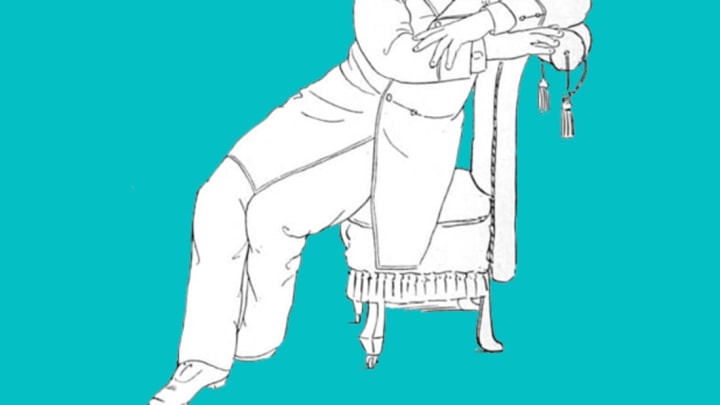Edmond Shaftesbury was the ne plus ultra of grandiose 19th century self-help kooks. I first heard of him because he invented a language called Adam-Man Tongue, but he produced dozens of works on everything from personal charisma, to brain training, to immortality. He is perhaps best known under his pseudonym, Dr. Ralston, for a health food cult he started called Ralstonism. (The Purina Company asked him to endorse their wheat cereal, and consequently became Ralston-Purina). Actually, Edmond Shaftesbury was a pseudonym too. His real name was Webster Edgerly. He had tons of crazy ideas, and no shortage of self-regard.
He had a particular passion for the theater, and once wrote, produced, and starred in his own play about which a New York Times reviewer said, the “originator, concoctor, and financial backer of this forlorn enterprise is a misguided person, who evidently labors under the triple hallucination that he is a poet, a dramatist, and an actor.”
No doubt Shaftesbury/Edgerly was undeterred by such unknowing opinions. After all, he had developed a system for “the management of the body and its members” that if carefully studied and committed to memory would turn anyone into “the PERFECT ACTOR.” Here are explicit instructions from “the Shaftesbury Method” on how to perform 11 tragic emotions.
1. Silent Sorrow
This attitude is made by raising the folded arms to the forehead.
“I must e’en submit.”
The Honeymoon, Act III, Scene IV
2. Mental Pain
This attitude is made by the weight on the right foot, placing the left hand upon the heart, the right upon the forehead, and inclining the head backward, the eyes looking upward.
“Why, how is this? What sudden change has come upon the world?”
Ingomar, Act IV, Scene I
3. Hopelessness
This attitude is made by inclining the head right oblique downward, allowing the right arm to rest over the top of the head, and the left arm to hang down.
“Farewell, sweet dreams.”
Parthenia, Act I, Scene I
4. Disconsolation
This attitude is made by inclining the head slightly forward; the eyes looking off; the shoulders elevated a little; the hands clasped, palms downward.
“Well death’s the end of all.”
Romeo and Juliet, Act III, Scene IV
5. Anguish
This attitude is made by placing the palms of both hands to the temple. The face looks up.
“Oh, now forever farewell to the tranquil mind!”
Othello, Act III, Scene II
6. Agony
This attitude is made by retiring the weight upon the left foot; placing the tips of the fingers of both hands back of the neck, the head falling back upon the left shoulders.
“O Antony! Antony! Antony!”
Antony and Cleopatra, Act IV, Scene I
7. Unpleasant Sounds
This attitude is made by placing the crooked fingers to the ears and showing facial disgust.
“There is a passing shrillness in her voice.”
The Honeymoon, Act I, Scene I
8. Sulkiness
This attitude is made by folding the arms, and looking down, the face being nearly concealed, and the body turned obliquely.
“And dogs bark at me as I halt by them.”
Richard III, Scene I
9. Hatred
This attitude is made by standing with the weight on the left foot retired; the hands down and clinched; the face looking right oblique.
“Thou rascal, thou art worst in blood to urn.”
Coriolanus, Act I, Scene I
10. Horror
This attitude is made by standing with the head thrown back, the face looking right oblique, both hands up and vertical in the right side, the left hand protecting the face, the weight on the left foot and the shoulders raised.
“Hence, horrible shadow: unreal mockery, hence.”
Macbeth, Act III, Scene IV
11. Hatred in Horror
This attitude is made by standing with the weight on the left foot retired, the shoulders raised; chin forward; crooked fingers raised to the mouth.
“An eye for an eye, and a tooth for a tooth!”
Leah the Forsaken, Act IV, Scene I
Bonus
Whew! That was exhausting and sad wasn’t it? Here’s a palate cleanser to dispel all that gloom. Be sure to practice it every day.
Neutrality
This attitude is formed by taking a No. 1 Oratorical position, the arms hanging down at the side.
“I am ready, so please your Grace.”
Merchant of Venice, Act IV, Scene I
